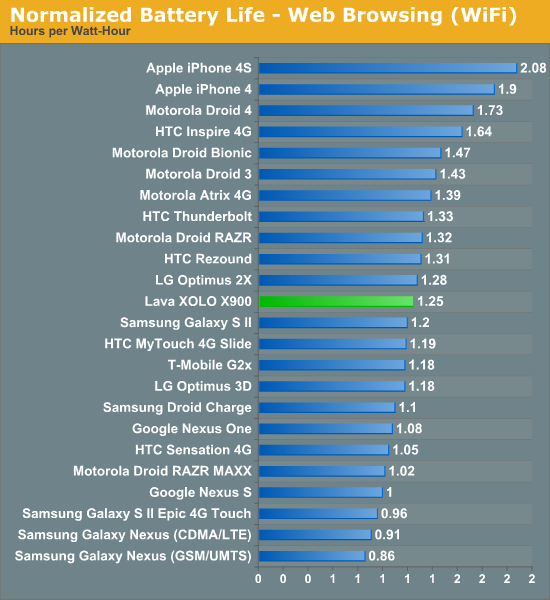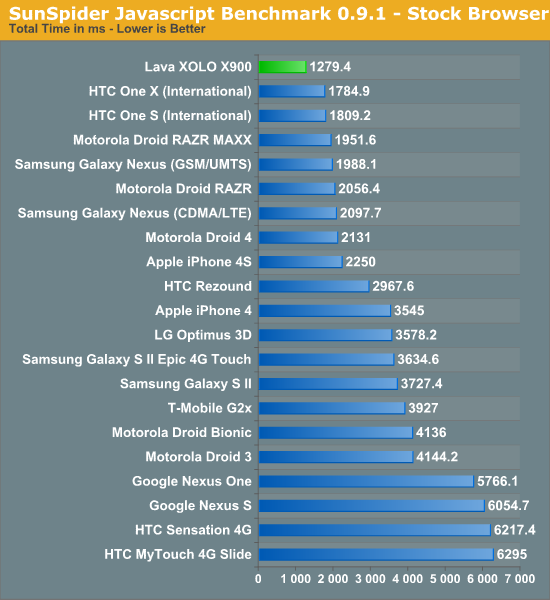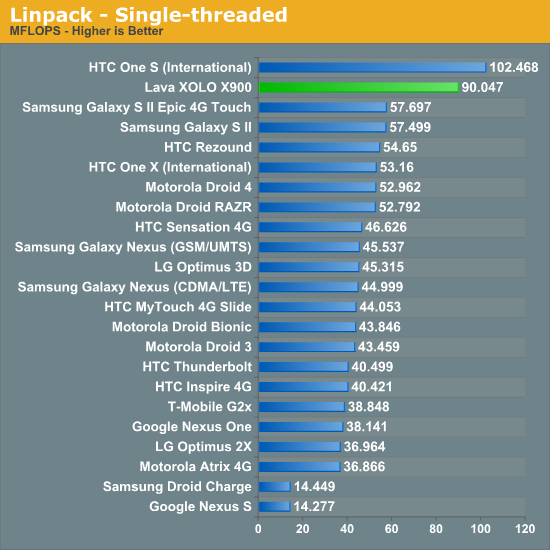Intel in Talks to Fab ARM Cores! (Rumor)
Page 2 - Seeking answers? Join the AnandTech community: where nearly half-a-million members share solutions and discuss the latest tech.
You are using an out of date browser. It may not display this or other websites correctly.
You should upgrade or use an alternative browser.
You should upgrade or use an alternative browser.
Well, when you consider that Intel currently has a fair percentage of their leading edge process manufacturing capability idling due to lack of demand...I don't see how this deal would help Intel maintain their 60% gross margin policy.
I would agree if not for TSMC's track record. I highly doubt that they weren't informed by their customers of approximately how many wafers were desired on their 28nm process well in advance, yet they were clearly unable to meet that demand for something around half a year. If Apple does indeed require around 415k wafers per year as one of the articles states, then they'd use up at least 80% of the additional capacity that TSMC's Fab 14 phase 5 and phase 6 would provide when they come online in 2014.Anyone who's on the ground and been to TSMC's Fab 14 complex knows exactly where Apple is having their next generation of IC's built. (20nm)
But since when has Apple gone with such a risky proposition? I seem to recall them being quite cautious with process transitions at Samsung for the simple reason that if it doesn't work out, it's not a $25 chip that they don't sell, it's a $500+ product. So yeah, it is possible that they'd switch over completely to TSMC, but almost certainly in such a way that they can source parts from both Samsung and TSMC during the transition.
It's also quite possible that for Intel, them idling the plant produces higher gross margins than running the plant to make a bunch of $20(that's what Apple SOC cost based on iSupply BOM) ARM chips/SOC's for Apple.Well, when you consider that Intel currently has a fair percentage of their leading edge process manufacturing capability idling due to lack of demand...
Put it this way: Intel Fab XXX (I'm making up numbers to show you an example of a scenario that is very possible)
Cost of idling plant: $40 million.
Potential revenue producing $20 ARM chips: $1 billion
Cost of revenue to produce such $20 ARM chips: $600 million
Using this example they report higher profit dollars, but lower gross margin and profit margin. $400 million in extra profit dollars sure, but gross margin comes down from their historical average of 55-60% to 40%.
Intel uses gross margin as it's measure of profitability, not actual profit dollar amount.
Again unless Intel decides to deviate from that history, I don't see that happening.
Apple will more likely go to TSMC.
I would agree if not for TSMC's track record. I highly doubt that they weren't informed by their customers of approximately how many wafers were desired on their 28nm process well in advance, yet they were clearly unable to meet that demand for something around half a year. If Apple does indeed require around 415k wafers per year as one of the articles states, then they'd use up at least 80% of the additional capacity that TSMC's Fab 14 phase 5 and phase 6 would provide when they come online in 2014.
But since when has Apple gone with such a risky proposition? I seem to recall them being quite cautious with process transitions at Samsung for the simple reason that if it doesn't work out, it's not a $25 chip that they don't sell, it's a $500+ product. So yeah, it is possible that they'd switch over completely to TSMC, but almost certainly in such a way that they can source parts from both Samsung and TSMC during the transition.
You should go onsite at Fab 14, you'll get the picture. This is one of those "proof of the pudding is in the eating" situations. As far as supply goes, exactly, which is why if you saw the pace of activity at Fab 14 then you'd recognize something is quite different now versus the past, and if you know someone in the industry who can tell you why it is different this time around, well, then the picture kinda gells :sneaky:
One thing though...
If TSMC is going to do it for Apple at Fab 14 anyway, why didn't TSMC accept Apple's $1 billion offer from a few months ago?
You have to understand Morris Chang. He turned down the same offer from Qualcomm. He likes the customer role to be well defined. It keeps his job simpler and prevents his other customers from feeling like they may become second-class citizens if they have to compete with Apple to get TSMC's attention.
Morris is smarter than that, there is a reason they brought him back from retirement despite being 80yrs old
You should go onsite at Fab 14, you'll get the picture. This is one of those "proof of the pudding is in the eating" situations. As far as supply goes, exactly, which is why if you saw the pace of activity at Fab 14 then you'd recognize something is quite different now versus the past, and if you know someone in the industry who can tell you why it is different this time around, well, then the picture kinda gells :sneaky:
Alas, my sources for information on TSMC are just whatever can be scrounged up on the internet and hence don't include going onsite
Anyway, no question that TSMC is the most likely candidate for Apple to switch to, and it's rather clear that TSMC is building up their infrastructure in anticipation of such... but there still seems to be room for other possibilities, no? Given a likely Q3 2014 product launch, they'd have a quarter or possibly two to decide before they have to lock in on a particular process for the design cycle. Heh, and it sounds exactly like Apple to explore all options in order to play one off the other and get the best terms possible.
Anyone today using x86 for phone is suicidal. Even if you can get it for free or at production cost from Intel or AMD the power consumption and heat will kill your project before it ship.
I'd imagine Intel is already fabbing ARM cores for their Infineon Wireless chips or planning to do so, and will go after Qualcomm, TI, ST Micro, MediaTek, etc in the future. They might come up with a low power RISC type instruction set similar to ARM (like ARC), but it would be very different than x86.
I'd imagine Intel is already fabbing ARM cores for their Infineon Wireless chips or planning to do so, and will go after Qualcomm, TI, ST Micro, MediaTek, etc in the future. They might come up with a low power RISC type instruction set similar to ARM (like ARC), but it would be very different than x86.
I'm guessing you didn't see Intel's Medfield vs. Tegra 3 charts...Anyone today using x86 for phone is suicidal. Even if you can get it for free or at production cost from Intel or AMD the power consumption and heat will kill your project before it ship.
I'd imagine Intel is already fabbing ARM cores for their Infineon Wireless chips or planning to do so, and will go after Qualcomm, TI, ST Micro, MediaTek, etc in the future. They might come up with a low power RISC type instruction set similar to ARM (like ARC), but it would be very different than x86.
Alas, my sources for information on TSMC are just whatever can be scrounged up on the internet and hence don't include going onsiteBut yeah, currently they're at something around 1,700k 12" wafers per year and if phase 5 and 6 of fab 14 double that fab's capacity then the total goes up to around 2,640k 12" wafers per year, with the new capacity guaranteed to be on the leading edge process node. Though there's still the question of how much of the existing 12" wafer capacity will be upgraded to the new node? Not to mention what demand from other sources is going to look like at that point?
Anyway, no question that TSMC is the most likely candidate for Apple to switch to, and it's rather clear that TSMC is building up their infrastructure in anticipation of such... but there still seems to be room for other possibilities, no? Given a likely Q3 2014 product launch, they'd have a quarter or possibly two to decide before they have to lock in on a particular process for the design cycle. Heh, and it sounds exactly like Apple to explore all options in order to play one off the other and get the best terms possible.
Apple has already decided, and both TSMC and Samsung are aware of the outcome of the decision, as are the suppliers (both tool and chemical vendors). It is the worst kept secret in the industry.
sm625
Diamond Member
- May 6, 2011
- 8,172
- 137
- 106
I think apple could very easily port iOS over to 22nm x86. Think about how many extra transistors they have to work with. They could shove an entire A6X core into their hypothetical A7 SoC and still end up with a smaller die. Remember, the ARM core section of the A6X is relatively small (< 30mm^2), even though the A6X is quite large at 124mm^2. Most of the A6X is gpu, and that doesnt care about ARM/x86 anyway.
Intel and AMD have both proven themselves to be incredibly stupid by not following any of my advice (integrated SSD controller, integrated PCH, a muxed NAND/DRAM bus, hybrid x86+ARM cores, etc) but apple may not be so dumb. They've at least done a couple of the things I suggested.
Intel and AMD have both proven themselves to be incredibly stupid by not following any of my advice (integrated SSD controller, integrated PCH, a muxed NAND/DRAM bus, hybrid x86+ARM cores, etc) but apple may not be so dumb. They've at least done a couple of the things I suggested.
I did read a story earlier last month or two ago about Samsung delaying building a fab in anticipation of them losing contract with Apple.Apple has already decided, and both TSMC and Samsung are aware of the outcome of the decision, as are the suppliers (both tool and chemical vendors). It is the worst kept secret in the industry.
zephyrprime
Diamond Member
- Feb 18, 2001
- 7,512
- 2
- 81
Processors stopped getting much faster every year so upgrade cycles have lengthened.clearly if they're moving Celerons to 22nm they don't have enough business to fill the fabs (how that happened, I have no friggin' idea).
Apple has already decided, and both TSMC and Samsung are aware of the outcome of the decision, as are the suppliers (both tool and chemical vendors). It is the worst kept secret in the industry.
in other words, this is fluff and crap?
The ball already rolled over to morris chang?
I was kinda excited about a new "Apptel" era approaching :C
I think apple could very easily port iOS over to 22nm x86. Think about how many extra transistors they have to work with. They could shove an entire A6X core into their hypothetical A7 SoC and still end up with a smaller die. Remember, the ARM core section of the A6X is relatively small (< 30mm^2), even though the A6X is quite large at 124mm^2. Most of the A6X is gpu, and that doesnt care about ARM/x86 anyway.
Intel and AMD have both proven themselves to be incredibly stupid by not following any of my advice (integrated SSD controller, integrated PCH, a muxed NAND/DRAM bus, hybrid x86+ARM cores, etc) but apple may not be so dumb. They've at least done a couple of the things I suggested.
CPU instruction set is no longer relevant today and it is easy to port. They do use x86 for OSX so they know how to do it anyways. The point is, for the same amount of die space, x86 is not scaling well for power and heat vs ARM on the same node size (i.e. 22nm). There is a reason why everyone use ARM right now, and x86 is losing out not because of monopoly but of power and heat.
Integrating SSD controller on the same die is very risky, by the time you are done with one design it needs to be changed for different generation of NAND chips. A lot of the hardware accelerating part of the SSD controller is designed to overcome NAND's weakness of the generation, primarily increasing block size and erase time, as well as parallelism of the number of chips to use. You either overpay for the NAND controller by putting it into the x86 CPU or you underdesign and have problem. Also a major part of SSD controller is to represent a LBA interface to the x86 OS like OSX, Linux, and Windows. A phone OS do not need to know all that as they can do wear leveling at higher level inside the OS. All they need is a small amount of code and interface to do what is needed, and can lay out files more efficiently without worrying about fragmentation or alignment to block boundary.
NAND and DDR are usually used at the same time because a lot of the processing are done before writing to NAND, and the amount of ram needed is in DDR, so it make sense to have both dedicated instead of MUXed. You need that for performance anyways and even the baseband chips from Qualcomm have them dedicated, so why should an AP like A6 or CPU like x86 have to share them?
joshhedge
Senior member
- Nov 19, 2011
- 601
- 0
- 0
FYI, this an Atom in a phone:



Not bad.
Not updated with the latest A15 variant SoCs though, such as 'Swift' and the latest Exynos.
in other words, this is fluff and crap?
The ball already rolled over to morris chang?
I was kinda excited about a new "Apptel" era approaching :C
yep
podspi
Golden Member
- Jan 11, 2011
- 1,982
- 102
- 106
Not updated with the latest A15 variant SoCs though, such as 'Swift' and the latest Exynos.
Unless I am mistaken, there are no phones shipping with an A15 atm.
RAZR i is shipping now
TSMC seems to trip over and fall on almost every single die shrink that they go to. Look at AMD and Nvidia cards the past 4-5 years for evidence.
I wonder how Apple will handle this with TSMC becoming the sole supplier for them at some point in the future.
http://www.extremetech.com/computin...y-with-tsmc-claims-22nm-essentially-worthless
I wonder how Apple will handle this with TSMC becoming the sole supplier for them at some point in the future.
http://www.extremetech.com/computin...y-with-tsmc-claims-22nm-essentially-worthless
Heh, now if only that Tom's Hardware article was actually capable of relating the entire rumor instead of actively attempting to negate the more interesting half.
http://tech.fortune.cnn.com/2012/11/30/intel-apple-samsung-chips/
Note that it's the second point that's news here. There have been rumors regarding Intel possibly fabricating chips for Apple before, but there was never any mention of why Intel would want to do so. Combined with the fact that the current market has resulted in fabs idling the lure of getting into the iPad would be more than adequate incentive for Intel.
There is no way that would happen. The iPad uses the same OS and apps as the iphone and ipod touch devices. There is ZERO chance they will fragment their mobile products by moving to x86 on the iPad. It's that second point that makes it abundantly clear this is nothing more than a rumor designed to get clicks. Apple is more likely to put ARM into their Macbook Air's then they are putting x86 in the iPad.
Last edited:
There is no way that would happen. The iPad uses the same OS and apps as the iphone and ipod touch devices. There is ZERO chance they will fragment their mobile products by moving to x86 on the iPad. It's that second point that makes it abundantly clear this is nothing more than a rumor designed to get clicks. Apple is more likely to put ARM into their Macbook Air's then they are putting x86 in the iPad.
Why are you implying fragmentation? Medfield runs most of the android apps fine. If they port iOS for x86 they could get a similar effect. Also remember that Apple did switch from others architectures and didn't give a damn about backward compatibility. If there is one company who can do that, it is Apple.
Personally I see here a win-win situation. Apple gets the best fab available, Intel gets a lot of insights on SoC design.
TRENDING THREADS
-
Discussion Zen 5 Speculation (EPYC Turin and Strix Point/Granite Ridge - Ryzen 9000)
- Started by DisEnchantment
- Replies: 25K
-
Discussion Intel Meteor, Arrow, Lunar & Panther Lakes + WCL Discussion Threads
- Started by Tigerick
- Replies: 24K
-
Discussion Intel current and future Lakes & Rapids thread
- Started by TheF34RChannel
- Replies: 23K
-
-

AnandTech is part of Future plc, an international media group and leading digital publisher. Visit our corporate site.
© Future Publishing Limited Quay House, The Ambury, Bath BA1 1UA. All rights reserved. England and Wales company registration number 2008885.

